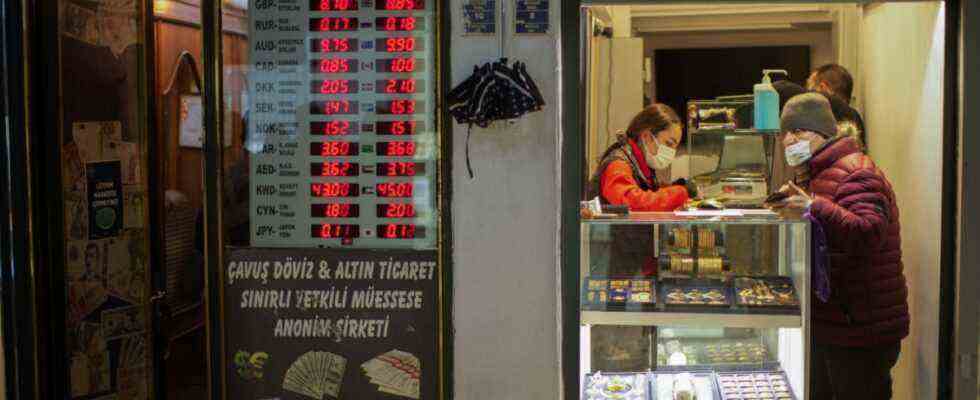In the end, the pressure from the horrendous price increases in Turkey was probably too great. The Turkish central bank TCMB did not lower the key interest rate further on Thursday, but kept it at 14 percent. The TCMB had cut borrowing costs four times in a row since September, despite rising inflation rates and the lira’s plunge. Turkey’s currency has lost almost half of its value against the dollar in three months last year, mostly due to interest rate cuts, experts say. The lira’s plunge accelerated already high inflation, which hit 36 percent in December, the highest in nearly two decades. An end to the exceptional monetary policy situation in Turkey is not yet in sight.
Most recently, Turkish President Recep Tayyip Erdoğan has softened his tone, but has not announced any fundamental change in direction for the year: “The exchange rate and interest rates will fall slowly, gradually and without haste” to make 2022 “our best year”. , state agency Anadolu Erdoğan was quoted as saying on Tuesday. Since September, Turkey’s central bank has gradually cut interest rates from 19 percent to 14 percent, causing the currency to continue to slide. While a dollar still cost between eight and nine lira in September, the price for a dollar has meanwhile risen to more than 18 lira, and is now around 13.5 lira. As a result of the currency collapse, imports became more expensive for the country. The producer prices of Turkish producers were even almost 80 percent higher than the previous year’s level. The central bank tried again and again to stabilize the lira with market interventions. At the end of December, the TCMB counteracted the fall in exchange rates with a large lira purchase program, and lira accounts were set up to secure deposits in the local currency.
In order to counteract the exuberant rate of inflation and the depreciation of the currency in the long term, the monetary watchdogs would actually have to raise the key interest rates – following the general economic consensus. But Erdoğan has been decreing an unorthodox monetary policy for his country for years. With the low interest rates, Erdoğan intends to heat up the economy, stimulate investments and make exports more attractive. On the other hand, he also claims that he wants to get a grip on inflation, which, however, is more the result of interest rates being too low than too high. Despite all the criticism, Erdoğan has repeatedly defended his course, including last December after the previous interest rate cut: “We fought to save the economy from the cycle of high interest rates and high inflation.” On the other hand, Erdoğan sees the responsibility for the economic difficulties as diffusely in the hands of foreign powers, imagining that his country is engaged in a kind of economic liberation struggle.
There have been four central bank governors since 2019
In addition to the adventurous monetary policy itself, the lost confidence in the independence of the TCMB is a major problem for the Turkish economy. Erdoğan has a high rate of central bankers attrition; He has repeatedly fired chairmen of the TCMB if they did not submit to his course. The current head of the TCMB, Şahap Kavcıoğlu, has been number four since 2019 and has so far been on the President’s line. Foreign investors, which the Turkish economy urgently needs, are deterred by the unpredictability of Turkey’s monetary policy. The Ministry of Finance is no better off. Erdoğan fired his previous boss, Lütfi Elvan, in early December because he no longer wanted to support the president’s low interest rate policy.
His successor, Nureddin Nebati, presents himself as a loyal supporter of Erdoğan. While economists at leading Wall Street banks such as JP Morgan Chase and Goldman Sachs consider it possible that inflation could increase significantly over the course of this year, Nebati assumes that the inflation rate will soon peak, as he did a week ago interview explained. In January, while the weakness of the lira and rising energy costs would add to inflation, inflation would then fall to lower levels in late 2022, also on the back of a drop in food costs in the summer – timing that bodes well for Erdoğan’s political future could be decisive, because elections are coming up next year. “We will be running in the general elections in June 2023 with single-digit inflation,” said Nebati. Erdoğan should like to hear that.

